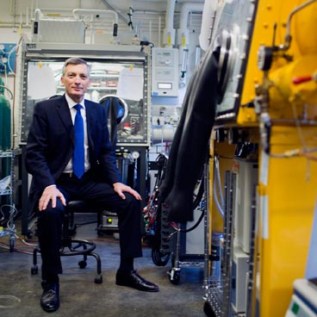By Hamish Johnston

When I was a PhD student, there was a group of retired professors that shared a tiny office in the physics department. It was whispered that one of them was extremely wealthy thanks to a successful commercial spin-out and we marvelled at the fact that he came in to work every day rather than enjoying the fruits of his labours. However, it wasn’t the wealthy professor who was destined for international fame. In 1994 his officemate Bertram Brockhouse shared the Nobel Prize for Physics, and Brockhouse’s quiet life changed dramatically. Indeed, he got his own office!
I was reminded of this little group when I read ZapperZ’s blog entry about his encounter with Ray Davis before Davis bagged the 2002 Nobel for his work on neutrinos. Sitting next to Davis on a two-hour flight, ZapperZ had an inkling that he was beside an interesting character after their brief chat about physics. But it wasn’t until the Nobel was announced several years later that he realized the opportunity he had missed.
ZapperZ writes about Davis because the American physicist is included in a list of “Seven great innovators in physics” as chosen by Alyson Foster of National Geographic. Others include Max Planck, Marie Curie and Lise Meitner.
What’s the best strategy for winning at rock-paper-scissors? The answer, according to three physicists in China, is to have absolutely no strategy and ensure that your choice of weapon is completely random. Now, to me that’s obvious, but perhaps I haven’t played enough of the game to have deluded myself into thinking that there was a winning strategy. You can read all about it in a paper on the arXiv preprint server entitled “Social cycling and conditional responses in the rock-paper-scissors game”. And if you would rather spend more of your time playing games, there is an excellent synopsis called “How to win at rock-paper-scissors”.
Finally, last night I listened to a fantastic radio programme about the business and technology of developing new batteries. Unlike computer chips, it has proved very difficult to make rapid improvements in battery technologies – despite the strong demand for better batteries for portable electronics, electric vehicles and storing energy from intermittent sources such as the wind and Sun.
In “Battery matters”, the BBC’s Peter Day explains why it has been so difficult to boost battery capacity and performance, and he talks to leading battery experts including the “extreme electrochemist” Donald Sadoway of the Massachusetts Institute of Technology. Sadoway argues that technologists are being too conservative in their choices of potential battery designs and materials. He also describes how batteries based on molten metal could play a role in the electricity grids of the future. Indeed, Sadoway has co-founded a company called AMBRI that is building these high-temperature batteries.



